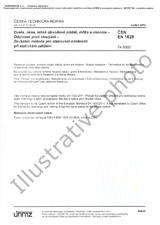We need your consent to use the individual data so that you can see information about your interests, among other things. Click "OK" to give your consent.
ČSN EN 62656-3 (010000)
Standardized product ontology register and transfer by spreadsheets - Part 3: Interface for Common Information Model
Automatically translated name:
Register and data spreadsheets ( spreadsheets ) - Part 3 : Interface for common information model ( standard for direct use as CSN ).
STANDARD published on 1.11.2015
The information about the standard:
Designation standards: ČSN EN 62656-3
Classification mark: 010000
Catalog number: 97924
Publication date standards: 1.11.2015
SKU: NS-618572
The number of pages: 100
Approximate weight : 331 g (0.73 lbs)
Country: Czech technical standard
Category: Technical standards ČSN
The category - similar standards:
Generalities. Terminology. Standardization. Documentation (Vocabularies)Technical product documentationIT applications in industry
Annotation of standard text ČSN EN 62656-3 (010000):
This part of IEC 62656 specifies an interface between IEC 62656 series and meta-model for CIM originally defined in IEC 61968 and IEC 61970 series of standards. The current CIM includes IEC 62325 series and the interface specified in this part of IEC 62656 also applies to the model defined in IEC 62325-301:2014. More specifically, this standard defines a formal mapping between the IEC 62656 and meta-model for CIM in order to import the CIM ontology into the IEC CDD, and to ensure the interoperability of ontologies of two standards, or even among a wider spectrum of standards. For the basis of the mapping from CIM to the data model defined in IEC 62656-1, the UML representation of CIM is referenced.
As a result of the interface specification available from this part of IEC 62656, the smart grid ontology defined in CIM becomes accessible and interoperable in the midst of ontology pieces originating in other ontology standards, encompassing material, environmental, and mechanical, and logistic domains of information. In addition, the specification may also cover the lifecycle of products.
This part of IEC 62656 also defines methods for transforming the IEC CDD content into the format defined in IEC 61968 and IEC 61970 series. However, this standard does not intend any standardization of the elements defined in IEC CDD as part of the CIM ontology, for all the definitions of IEC CDD are already part of an acknowledged horizontal International Standard known as IEC 61360-4-DB. Rather it makes the pieces of information stored in IEC CDD available for further standardization or customization in power electric domains or more specific user communities as a basic resource, in particular for the purpose of extending the CIM series of standards.
The data model of this part is based on IEC 62656-1 which specifies the logical structure for a data parcel, or just simply "parcel," that is a short name for the medium of registering or transferring of product ontology. Such a parcel may be typically implemented in a leaf of a spreadsheet. The data model built on a set of parcels is called "parcellized ontology model", which is often abbreviated as "POM" in the remainder of this document.
This part of IEC 62656 specifies:
- - the mapping rules and principles for importing CIM UML objects into POM;
- - the syntactic and semantic requirements on the parcellized CIM objects;
- - the piecewise version control mechanism in POM for the parcellized CIM objects.
The following items are outside the scope of this part of IEC 62656:
- - definition of the interface between CIM UML and CIM RDF;
- - specification of syntactic and semantic requirements on CIM UML;
- - specification of syntactic and semantic requirements on CIM RDF
Preview of the standard ČSN EN 62656-3 (010000)
We recommend:
Technical standards updating
Do you want to make sure you use only the valid technical standards?
We can offer you a solution which will provide you a monthly overview concerning the updating of standards which you use.
Would you like to know more? Look at this page.




 Cookies
Cookies
